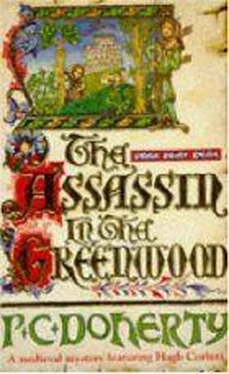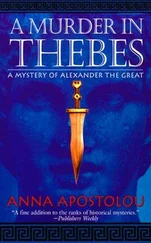Paul Doherty - Assassin in the Greenwood
Здесь есть возможность читать онлайн «Paul Doherty - Assassin in the Greenwood» весь текст электронной книги совершенно бесплатно (целиком полную версию без сокращений). В некоторых случаях можно слушать аудио, скачать через торрент в формате fb2 и присутствует краткое содержание. Жанр: Исторический детектив, на английском языке. Описание произведения, (предисловие) а так же отзывы посетителей доступны на портале библиотеки ЛибКат.
- Название:Assassin in the Greenwood
- Автор:
- Жанр:
- Год:неизвестен
- ISBN:нет данных
- Рейтинг книги:3 / 5. Голосов: 1
-
Избранное:Добавить в избранное
- Отзывы:
-
Ваша оценка:
- 60
- 1
- 2
- 3
- 4
- 5
Assassin in the Greenwood: краткое содержание, описание и аннотация
Предлагаем к чтению аннотацию, описание, краткое содержание или предисловие (зависит от того, что написал сам автор книги «Assassin in the Greenwood»). Если вы не нашли необходимую информацию о книге — напишите в комментариях, мы постараемся отыскать её.
Assassin in the Greenwood — читать онлайн бесплатно полную книгу (весь текст) целиком
Ниже представлен текст книги, разбитый по страницам. Система сохранения места последней прочитанной страницы, позволяет с удобством читать онлайн бесплатно книгу «Assassin in the Greenwood», без необходимости каждый раз заново искать на чём Вы остановились. Поставьте закладку, и сможете в любой момент перейти на страницу, на которой закончили чтение.
Интервал:
Закладка:
In the booths and stalls just inside St Mary's graveyard, he found a scribe who etched a crude map of the surrounding countryside, indicating which route he should take to reach the Priory of Kirklees. The fellow took his time, chattering like a magpie about how hobgoblins had been seen sitting on a tomb and feasting on human flesh, and how such evil sprites plagued the roads round Nottingham. Corbett tapped his boot in frustration but at last the man finished. Corbett grabbed the map, paid the fee and left the churchyard.
The visit to the scribe must have cost him an hour. By the time he left the city gate, joining others as they wound their way along the country track, Corbett found his serenity disturbed. By nature he was a solitary man, accustomed to the subtle intrigue of court around him as well as the dangerous street politics of London. This had given him a heightened sense of danger. Now he felt uneasy, certain he was being watched and followed. At first he felt protected by the other travellers but eventually these left the main highway, returning to outlying villages or farms. At last Corbett travelled alone, the silence broken by scuffling in the hedgerows, the occasional burst of bird song or the steady hum of the crickets. Corbett eased the sword in his belt, letting his horse amble gently as he himselt breathed in deeply and strained his ears to catch any sound of danger.
As he approached the forest, his anxiety increased. Who was tracking him? he wondered. Was it the traitor in the castle or was it Achitophel? Had the French assassin arrived in Nottingham and was he planning to strike here in the lonely countryside? The line of trees drew nearer.
Corbett stopped and looked round. So far he had travelled through open countryside where an assailant would have to use hedges or a small copse for concealment. He urged his horse on and entered the forest. The sunlight faded and, once again, Corbett became aware that the forest was a living thing; the crackling in the undergrowth, the fluttering of birds, the growing darkness and sense of utter loneliness. Suddenly Corbett heard chatter, the noise of conversation somewhere in front of him, but resisted the urge to whip his horse into a headlong gallop. He peered over his shoulder but could see no signs of pursuit whilst ahead of him he glimpsed other travellers. They stopped, looking back in alarm at the sound of his horse's hooves. Corbett saw one of them unstring a bow so reined in his horse and held up his left hand in a sign of peace.
'Who are you?' the man called.
'An honest traveller,' Corbett replied, 'eager for your company.'
'You are alone?' 'Of course.'
'Then come forward slowly.'
Corbett dug his knees into his mount's sides and the group waited to receive him. They, were a mixed band: men, women and children, protected by retainers, a number of families intent on visiting the Blessed Thurstan's tomb at York. Corbett journeyed with them until they arrived at a tavern' at some crossroads in time for the midday meal.
The place was a hive of activity. Peasants and villeins and travellers of every sort thronged the busy stable yard whilst the taproom was packed to overflowing. Ostlers took their horses and Corbett went inside, sitting by an overturned beer barrel near the window. He felt hungry so asked for a jug of ale, a broth of peas and onions with sippets, and a raston or small loaf made of sweetened flour and enriched with eggs. While eating he watched the other travellers take their ease. A pardoner appeared, pretending to speak Latin but now and again telling the pilgrims anecdotes full of coarse merriment. The taproom was filled with the clatter of jugs and basins, the cries of children, the braying voice of the pardoner, and the low hum of conversation as traders, tinkers and merchants exchanged gossip about the roads and markets.
Corbett stared round. He could see no one who might pose a threat. No one he could recognise from the castle or the town. One of the pilgrims, a young girl, stood up to sing a song in a clear voice. Corbett leaned back, eyes closed, and listened as the girl described the bird song of summer.
'Everywhere summer sings,' she sang.
A tremendous commotion from the yard outside drowned the song as customers sprang to their feet at the alarm: 'Fire! Fire!'
Corbett joined the rest in the yard. Ostlers were dragging horses from the stables and the air was sharp with the acrid smell of burnt straw. Corbett saw a wisp of flame from the end stable but servants carrying buckets of water soon doused the fire. The atmosphere relaxed, the customers laughed and everyone trooped back into the taproom. Corbett took his seat and grasped his tankard, then stopped. He had to stretch out for it, from right to left, but knew he'd never have left his tankard there. Maeve was always nagging him about resting cups and jugs at the edge of tables.
'You are lazy,' Hugh, she would berate him. 'You like to pick up your cup with the minimum of effort. Baby Eleanor loves that too.'
Corbett stared at the tankard. Someone had moved it, but why? A servant rushing by the barrel to get to the door? Or someone with a more sinister intent? He took the tankard and cradled it in his hands. He peered quickly round the tavern. He could recognise no stranger and was sure no one was watching him. He lifted the tankard, sniffed it carefully, and beneath its malty tang caught something more subtle, sharp and acrid. Corbett put the tankard down and breathed deeply, trying to control his panic. Had it been poisoned or was he losing his wits? He remembered the rat-catcher he had seen outside, sprawled on the cobbles, his back to the tavern wall, sunning himself. Corbett went out and stood over him. The seamy yellow-faced man looked up.
'You have business with me, sir?'
Corbett produced a coin and gestured at the man's empty rusting cages. 'Could you catch me a rat?'
The fellow caught the glint of silver and his mouth broke into a toothless smile.
'Can a bird fly?'
He picked up one of his small cages and shuffled across to one of the outhouses where hay and grain were stored.
Corbett sat and waited for a quarter of an hour. At last the fellow returned. Now his cage contained a long-tailed, fat-bellied rat which pushed its snout aggressively against the wire, yellow teeth protruding, blood-red eyes gleaming in fury.
'A prince among rats,' the fellow declared. 'You wanted it alive?' He held out a dirty claw for the coin. Corbett handed it over.
'There's another for a piece of cheese and your tongue remaining silent about what you see.'
The man shrugged, dug into his greasy wallet and handed Corbett a piece ot spongy cheese so putrid it stank. Corbett placed the small cage on the ground, the piece of cheese next to it. The rat pushed its snout against the bars, tantalised by the smell. Corbett then poured the contents of his tankard over the cheese and, using a stick, pushed it into the cage. The rat attacked it voraciously, peeling off strips like a man would an apple. The cheese disappeared, the rat raised its head, sniffing at the air, then suddenly moved sideways. It rolled on its back, dirty underbelly up, clawing the air. A greenish substance trickled between its jaws as it convulsed in its death throes.
'That's the last time I'm eating that bloody cheese!' The rat-catcher's beady eyes studied Corbett. 'Or better still, Master, perhaps you should be more careful what you drink!'
Corbett went back into the tavern, shouting for the landlord as he tried to control his own fear at the horrible death he had just escaped. He handed over the tankard as well as another coin.
'That is the most expensive meal I have ever bought.'
The taverner looked at him quizzically.
'I want that tankard destroyed,' Corbett insisted. 'And a cup of your best claret. But I will choose the cup and broach the cask myself.'
Читать дальшеИнтервал:
Закладка:
Похожие книги на «Assassin in the Greenwood»
Представляем Вашему вниманию похожие книги на «Assassin in the Greenwood» списком для выбора. Мы отобрали схожую по названию и смыслу литературу в надежде предоставить читателям больше вариантов отыскать новые, интересные, ещё непрочитанные произведения.
Обсуждение, отзывы о книге «Assassin in the Greenwood» и просто собственные мнения читателей. Оставьте ваши комментарии, напишите, что Вы думаете о произведении, его смысле или главных героях. Укажите что конкретно понравилось, а что нет, и почему Вы так считаете.












